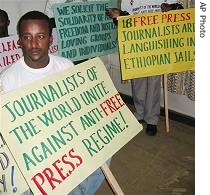2006年VOA标准英语-Eritrea, Ethiopia Ranked Among Worst Press Viol
时间:2019-01-12 作者:英语课 分类:2006年VOA标准英语(十月)
By Cathy Majtenyi
Nairobi
24 October 2006

Ethiopian journalists demand release of more than a dozen jailed colleagues during a press conference in Nairobi, May 2, 2006
The global press watchdog, Reporters Without Borders, says Eritrea and Ethiopia are ranked among the worst violators of press freedom in the world, while Benin, Namibia, and Mauritius are among the best countries in Africa for press freedom. Reporters Without Borders has released its annual press-freedom report.
----
To come up with its index, the Paris-based organization looks at such factors as censorship, threats, intimidation 1 or physical reprisals 2 levied 3 against journalists as they gather and report information.
Out of the 168 countries surveyed, the Horn of Africa nation of Eritrea ranked 166th, doing slightly better than Turkmenistan and North Korea.
The head of Reporters Without Borders' Africa desk, Leonard Vincent, tells VOA that in 2001, Eritrean President Isaias Afwerki suspended the private press in his country and launched a security operation to arrest influential 4 members of the private press who appealed for democratic reforms in the young country.
"There are more than 100 political prisoners somewhere in the jails of the country," said Leonard Vincent. "At least 13 journalists are in jail. They have no access to their lawyers or to their families. So this is a very concerning situation."
Several years ago, a Voice of America reporter was arrested and jailed in Eritrea because of a report he filed for VOA. He has since been released.
Eritrean authorities could not be reached for comment.
Slightly behind Eritrea is its neighbor, Ethiopia, ranked 160th out of the 168 countries surveyed.
The organization says this is primarily because of last year's crackdown by the government against journalists, opposition 5 supporters, activists 6, and others contesting the results of the May 2005 elections.
Dozens of journalists were arrested and charged with treason, including five VOA reporters charged in absentia. About 20 journalists still remain behind bars, possibly facing the death penalty because of their reporting.
The head of Ethiopia's Press, Film, License 7, and Regulation Department, Fantahun Asress, tells VOA that press freedom is a reality in Ethiopia, saying that since 1992, more than 1,100 licenses 8 have been granted to private and government newspapers, broadcasters, and other media.
Fantahun says he thinks it is the private media that is plagued with problems.
"The major ones are: lack of professionalism; weak organizational structure; and the other is the political attitude of journalists," said Fantahun Asress. "Journalists usually report based on their own political grounds."
Reporters Without Borders also expressed concerns about Uganda, which was ranked 36 places lower than the previous index. Vincent explains.
"In Uganda, the situation was really bad during the elections in the beginning of this year, where several foreign correspondents were threatened or expelled, and information was kept under strict control of the government," he said.
Vincent says the governments of Kenya, Burundi, and Rwanda also displayed hostility 9 towards journalists in 2006. Low rankers in other parts of the continent include: Gambia; Somalia; Democratic Republic of Congo; Zimbabwe; and Equatorial Guinea.
But there were some bright spots in Africa. Benin, Namibia, and Mauritius are ranked among the best countries in Africa for press freedom, with Ghana making good progress.
Vincent says in countries such as those, journalist groups are strong and responsible, there is a viable 10 opposition press, and journalists do not have to fear facing systematic 11 intimidation and arrest.
- The Opposition alleged voter intimidation by the army.反对党声称投票者受到军方的恐吓。
- The gang silenced witnesses by intimidation.恶帮用恐吓的手段使得证人不敢说话。
- They did not want to give evidence for fear of reprisals. 他们因为害怕报复而不想作证。
- They took bloody reprisals against the leaders. 他们对领导进行了血腥的报复。 来自《简明英汉词典》
- Taxes should be levied more on the rich than on the poor. 向富人征收的税应该比穷人的多。
- Heavy fines were levied on motoring offenders. 违规驾车者会遭到重罚。
- He always tries to get in with the most influential people.他总是试图巴结最有影响的人物。
- He is a very influential man in the government.他在政府中是个很有影响的人物。
- The party leader is facing opposition in his own backyard.该党领袖在自己的党內遇到了反对。
- The police tried to break down the prisoner's opposition.警察设法制住了那个囚犯的反抗。
- His research work was attacked by animal rights activists . 他的研究受到了动物权益维护者的抨击。
- Party activists with lower middle class pedigrees are numerous. 党的激进分子中有很多出身于中产阶级下层。 来自《简明英汉词典》
- The foreign guest has a license on the person.这个外国客人随身携带执照。
- The driver was arrested for having false license plates on his car.司机由于使用假车牌而被捕。
- Drivers have ten days' grace to renew their licenses. 驾驶员更换执照有10天的宽限期。 来自《现代汉英综合大词典》
- Jewish firms couldn't get import or export licenses or raw materials. 犹太人的企业得不到进出口许可证或原料。 来自辞典例句
- There is open hostility between the two leaders.两位领导人表现出公开的敌意。
- His hostility to your plan is well known.他对你的计划所持的敌意是众所周知的。
- The scheme is economically viable.这个计划从经济效益来看是可行的。
- The economy of the country is not viable.这个国家经济是难以维持的。
- The way he works isn't very systematic.他的工作不是很有条理。
- The teacher made a systematic work of teaching.这个教师进行系统的教学工作。